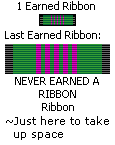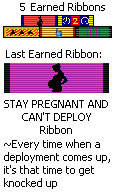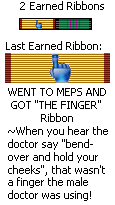
 |
|
|||||||
|
Family Members join our new Facebook group sponsored by NavyDEP: https://www.facebook.com/groups/Rtcgreatlakes
|
 |
|
|
Thread Tools | Display Modes |
|
|
|
|
#1 | |
|
Newbie
 Join Date: May 2014
Location: Simi Valley, CA
Posts: 5
Rep Power: 6  |
Quote:
I'm Future Sailor Brown (brown was already taken, which is why I'm stuck with BRO XD) and I leave for RTC on the 19th, so there's a great chance we'll be paired together or at the very least we will be going through boot camp together. I look forward to working with you and earning our Sea Legs in the years to come, especially considering we'll both be stationed at Pennsecola for A School. @Temen: Thank you so much for making this thread. As you've noted, it's hard to find people who are AV'S to become AE'S/AT'S and I have had little to no luck in finding threads specifically taking on questions like this format. I haven't gotten to the bottom of the page, so I apologize for asking what you may have already answered, but I do have some questions that have been weighing on my mind. 1) I was under the impression that Aviation Electronics Mate's were the ones who did the trouble shooting, but you mentioned that that's the AT'S mostly. I was hoping to do trouble shooting and work on the software systems mainly for the experience, because i'm interested in the science behind these professions, so my first question is where is that dividing line between AT and AE? 2) My second question is: what is an average day for you like? Pretty straightforward, just interested in what to look forward to and watch out for. 3) Third (a two part question), what are some studying tips that you wish you knew or that you utilized for A-School? I can imagine these rates being very academic oriented as your attention to detail will directly impact the safety of more than one life and I can only assume there's a plethora of information to be learned. As someone with little to no technical knowledge, how can/will I retain all of the information needed to do my job correctly? 4) Lastly, what are some things you wish you'd have known earlier (either before shipping off to boot, or during A-School) that you know now? Thank you in advance! |
|
|
|

|
|
|
#2 |
|
**Active Duty**
 Join Date: Apr 2013
Location: NAS Lemoore
Posts: 145
Rep Power: 23  |
Sorry for the slow replies to this thread. I don't get on this site as often as I would like to.
1. Every rate will do some troubleshooting, it's just a question of to what extent and what systems. Airframes will troubleshoot the hydraulics system, Mechs will troubleshoot the engines, etc. The defining difference for AEs is that we troubleshoot the electrical signals that connect all of these components together. We have to see if the failed parts are receiving electrical power and the correct "command signals" or if they are sending the correct "position signals". This is why I believe being an AE is the best rate to learn the whole jet. We have to understand how every component of the jet works so we know what signals are supposed to be sent and received by each part. We also have to understand the differnces between broken wires, shorted wires, and corroded wires. ATs (from my experience) mostly deal with the computers that run the jet. So they work closely with the AOs to troubleshoot the weapons systems and they also troubleshoot the radar and communications systems. From what I've seen in the O-Level they generally will just replace the computers that are at fault. They are also capable of uploading new software onto the computers, but generally at the O-Level we can't fix or troubleshoot the computers in the same sense as you would a personal computer. 2. I usually wake up around 0400 to give myself some time with my family before work. My average work day is around 0700-1600. Now keep in mind, you have to be 30 minutes early to EVERYTHING. So I usually leave my house around 0600 so that I have plenty of time to arrive before 0630. On days that we have PT (usually Mon, Wed, Fri) we have PT from 0630-0730 and have to be at work by 0830. As soon as we get to work we check tools, get the tool log set up, sign into the server to print out our current work load. At 0700 the shift supervisor goes to Maintence Meeting and the rest of us go to FOD Walkdown. After FOD Walkdown, the supervisor tells us what the Maintence Chiefs put out. Generally the status of our aircrafts, some critical flight schedule information, work priorities, and any misc. information the Chiefs feel we should know (anything from local events, safety concerns, etc). Usually you can ask to go to the Galley anytime it is open, just know you may be limited on time depending on the work load. Also, only a few people will go to lunch at a time, so work can still be done. Around 1530, the Night Check starts to come in. At 1600, Night Check has their maintenance meeting and generally we start switching out workers. Days will wait to hear Night Check maintenace notes and then go home. My command has 4 duty sections, though the exact number is command dictated. Every day we cycle through duty sections (example: Monday - 1, Tuesday - 2, Wednesday - 3, Thursday - 4). And whoever has duty Friday will have duty Friday, Saturday, and Sunday. During duty days you can't leave the area (usually about an hours drive) and you have to be ready to come back to work at any time (so have your cellphone ready). This means you can't drink and you should try to avoid setting up appointments on your duty days. Also on your duty days you are most likely to have a watch. My command has 8 hour watches, but my last command had 12 hour watches. Watches are genernally either a rover type or an admin type. E-4 and below generally get the Rover watches and they are given an area to rove around. You don't have to constantly rove (usually), but you are expected to check the area at least once an hour. You may also be tasked to clean, wax floors, drive people, or any other task the duty section leader asks of you. E-5 and E-6 are generally given the admin type watches. Usually this consists of receiving phone calls during off-work hours, keeping track of who checks in and out of leave, and keeping the log book up to date. You are also directly in charge of the rovers and responsible to ensure they complete all tasks given to them. Basically, you are in charge of the work place at the end of the work day. 3. I wish I knew about navybmr.com they list all of the publications you should study to pass the current advancement exam. These publications are also the basis for the lessons that you are taught during A-School. For the most part A-School does a good job of teaching technical knowledge to people with no experience in the area. So just focus on maintaining good study habbits. Find what works best for you wether they are flash cards, study groups, writing a lot of notes, etc. 4. You should try to read through the BMR. http://www.navybmr.com/study%20mater...MR%2014325.pdf It contains most of the military information that basic training will teach you. I also wish I knew about the FTS program, but I'm glad things went the way they did. If I can think of anything else, I'll be sure to post it in this thread.
__________________
AE2 (AW) Temen, USN Active Duty. F/A-18 A-F O-Level Maintainer Auxiliary Security Force |
|
|

|
|
|
#3 | |
|
Newbie
 Join Date: May 2014
Location: Simi Valley, CA
Posts: 5
Rep Power: 6  |
Quote:
|
|
|
|

|
|
|
#4 |
|
Junior Member
 Join Date: Feb 2014
Location: NAS Lemoore
Posts: 27
Rep Power: 8  |
Thank you @Temen.
@FutureSailorBro my DAR was approved for an earlier ship date. I ship 20140916. So I'll most likely be graduating as your heading to Great Lakes. |
|
|

|
|
|
#5 |
|
Newbie
 Join Date: Feb 2014
Posts: 5
Rep Power: 6  |
Temen,
Lots of good information here. Thanks. I was wondering if you have an opinion on getting a laptop or Ipad for AV A School at Pensacola. Is it needed or helpful as far as classes go? I know I'll want one for communication with family and friends but wondered if one or the other would help with school. Thanks! |
|
|

|
|
|
#6 | |
|
**Active Duty**
 Join Date: Apr 2013
Location: NAS Lemoore
Posts: 145
Rep Power: 23  |
Quote:
You are never required to have a computer though, as there are plenty of computers for everyone in the class. Basically, don't worry about having a computer for work purposes because one will be provided and you will not be able to plug into the government network in class anyway.
__________________
AE2 (AW) Temen, USN Active Duty. F/A-18 A-F O-Level Maintainer Auxiliary Security Force |
|
|
|

|
|
|
#7 |
|
**Active Duty**
 Join Date: Apr 2013
Posts: 184
Rep Power: 25  |
Got in the thread a little late but here's what I personally see add the difference between the AV rates.
AE - they are mostly O level working on the wiring between the components throughout the whole jet. AT O level - they troubleshoot and replace faulty electronic components on the jet. AT I level - this is what I am. We work in freezing cold workshops on the gear that O level pulls out from the jet, repair them, and send them back out. We don't work directly on the planes. |
|
|

|
|
|
#8 | |
|
Newbie
 Join Date: Feb 2014
Posts: 5
Rep Power: 6  |
Quote:
Thanks, Temen. |
|
|
|

|
|
|
#9 |
|
Newbie
 Join Date: May 2014
Location: Simi Valley, CA
Posts: 5
Rep Power: 6  |
|
|
|

|
 |
|
|